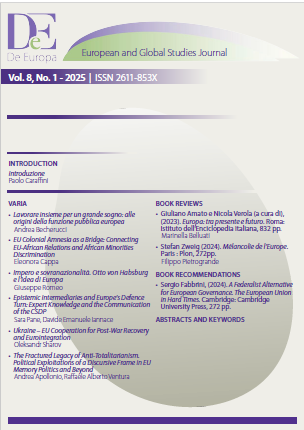Impero e sovranazionalità. Otto von Habsburg e l’idea di Europa
DOI:
https://doi.org/10.13135/2611-853X/12370Abstract
The Europe in its thousand-year history, in its alternating and almost never painless events, in the attempt to
resolve a complexity dictated by the authority of the various leaderships that have succeeded and reconfigured
gradually over time, according to the ability to conquer power or through presumed dynastic rights, represents
a good laboratory between what is a succession and overlapping of histories of empires and what is the effect
of the growth of an empire often underlying the concept of imperialism. In their evolution as models of
governance and territorial planning, empires have presented themselves in human and European history not
only as concentrated formulas of power and might but also as vehicles for the distribution of ideas and values,
creating contaminations decisive in the peoples that compose them to the point of causing both their rise and
their decline, both due to the economic conditions of support or to the internal stability, in terms of consensus,
of the imperial authority and its recognized or not legitimacy. Otto of Habsburg-Lorraine (or Otto von
Habsburg-Lothringen), member of the European Parliament in 1979 for the German Christian Social Union
(CSU), and reconfirmed until 1999, never put aside the "European" meaning of the supranational Austro-
Hungarian empire.
Keywords: Aristide Briand, Ausgleich, German Confederation, Berlin Conference, continentalism, Europe of the
peoples, Europeanism, Franz Joseph, Great War, Thirty Years War, Gustav Stresemann, Ottoman Empire,
liberalism, liberalism, machtpolitik, Orbis Europeus Christianus, continental order, Otto von Habsburg, Peace of
Augsburg, Peace of Carlowitz, Peace of Westphalia, Paneuropa, European Parliament, Eastern Question, Richard
Nikolaus Graf Coudenhove-Kalergi, Totalitarianisms, Vienna, Weimar



 The journal has been approved for inclusion in DOAJ. The DOAJ listing of the journal is available at
The journal has been approved for inclusion in DOAJ. The DOAJ listing of the journal is available at 

